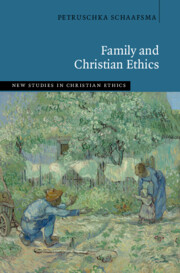Family and Christian Ethics
In this book, Petruschka Schaafsma offers an innovative appraisal of family. Eschewing the framework of worry and renewal that currently dominates family studies, she instead explores the topic through the concepts of ‘givenness’ and ‘dependence’. ‘Givenness’ highlights the fact that family is not chosen; ‘dependence’ refers to being intimately included in each other’s identities and lives. Both experiences are challenging, especially in a contemporary context, where independence and freedom to shape one’s own life have become accepted ideals. Schaafsma shows the impasses to which these ideals lead in several disciplines – theology, philosophy, sociology, social anthropology and care ethics. She moves constructively beyond them by tapping literary, artistic and biblical sources for their insights on family. Grounded in a theological approach to family as ‘mystery’ rather than ‘problem’, she develops an understanding of the current controversial character of family that accounts for its ordinary and transcendent character. This title is also available as Open Access on Cambridge Core.
Petruschka Schaafsma is Professor of Theological Ethics at the Protestant Theological University, the Netherlands. She runs a research programme in ethics and theology on the meaning of family as part of a project on morality in times of pluralism and polarisation, and she is the editor of The Transcendent Character of the Good.



